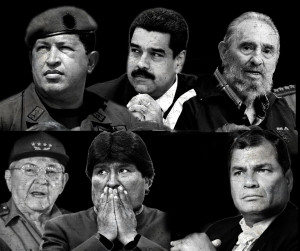Carlos Sánchez Berzaín
March 6, 2018
 (Interamerican Institute for Democracy) The ending of democracy and the onset of dictatorships with a populist disguise in Venezuela, Bolivia, Nicaragua, and Correa’s Ecuador, as well as the threat looming over Colombia to be Cuba’s operational satellite, all have as an essential component the control of political power to pursue narcotics trafficking that they all seek to cover up with their anti-imperialist discourse against the United States. For the Castroist Chavist system, narcotics’ trafficking is key in its strategy, something we cannot afford to ignore in the fight to restore democracy in narco-states with self-proclaimed anti-imperialist dictators such as in Venezuela, Bolivia, and others still under cover.
(Interamerican Institute for Democracy) The ending of democracy and the onset of dictatorships with a populist disguise in Venezuela, Bolivia, Nicaragua, and Correa’s Ecuador, as well as the threat looming over Colombia to be Cuba’s operational satellite, all have as an essential component the control of political power to pursue narcotics trafficking that they all seek to cover up with their anti-imperialist discourse against the United States. For the Castroist Chavist system, narcotics’ trafficking is key in its strategy, something we cannot afford to ignore in the fight to restore democracy in narco-states with self-proclaimed anti-imperialist dictators such as in Venezuela, Bolivia, and others still under cover.
History shows isolated cases of partial takeover of power by narcotics’ traffickers, or cases of temporary control through political candidates or legislators in Colombia, or the case of dictator Noriega in Panama. Up to the time of the alliance between Hugo Chavez and Fidel Castro that birthed the so called, Bolivarian movement, 21st Century Socialism, or simply “Castroist Chavist” doctrine, however, we had never seen the simultaneous total control of several countries wherefrom all types of narcotics’ trafficking crimes are committed and who are internationally defended.
The neo-logism title of “narco-state” describes “those countries whose political institutions are significantly influenced by narcotics’ trafficking and whose leadership are government officials who are, at the same time, members of drug production or trafficking networks shielding themselves behind their legal privileged status in order to pursue criminal activities”. News media, international representatives, academic experts, and even the evidence of judicial rulings, all render Venezuela with Nicolas Maduro and Bolivia with Evo Morales the status of narco-states.
Some of the proof in Venezuela’s case are the nephews of Maduro’s wife condemned in New York for narcotics’ trafficking, or the rescue efforts to avoid the extradition from Aruba to the US of General “Pollo Carvajal” former intelligence chief of the regime. Today, Venezuela is known as “the narcotics’ axis” of cocaine from the Colombian FARC with an official trafficking route from Bolivian territory controlled by Evo Morales.
In Bolivia, the top and perpetual leader of the coca leaf harvesters, Evo Morales, is the head of the Plurinational State of Bolivia wherein “by decree of law” he has increased the lawful cultivation of coca by 83% from 12,000 to 22,000 hectares and has increase the cultivation of unlawful coca from the existing 3,000 hectares in 2003 –the year they toppled President Sanchez de Lozada- to the current 50,000 hectares. The coca leaf harvesters’ unions from the tropical areas of Cochabamba are his main political base for mobilizations and repression, as seen in the massacre of Cochabamba on 11 January of 2007. Morales’ coca leaf harvesters –under the protection from the State- have now become cocaine producers.
Senator Roger Pinto, recently deceased in an “aviation accident” currently under investigation in Brazil, was persecuted, forced to seek asylum in the Brazilian embassy in La Paz, and afterwards exiled for publicly denouncing the link of official flights with cargo loads of drugs from Bolivia to Venezuela. Evo Morales’ drug czar Colonel Rene Sanabria was arrested by DEA for cocaine trafficking and has been sentenced by US judges to jail, where he is now serving time.
Both, Venezuela’s and Bolivia’s regimes have expelled the US DEA from their country. DEA conducted intelligence gathering and international coordination tasks with excellent results in the fight against narcotics’ trafficking. These regimes have also expelled the accredited US Ambassadors to their country. Following the same pro-narcotics policy disguised as anti-imperialism, Rafael Correa in Ecuador expelled the DEA, the US Ambassador, and removed all US presence from the US counternarcotics base at Manta in Guayaquil, Ecuador.
Narco-states, moreover, make the defense of their illicit activities a matter of international policy. Evo Morales in his address to the UN –with the backing of Cuba, Venezuela, Ecuador, Nicaragua- has requested the decriminalization of drug production, has accused DEA for Morales’ own crimes (as he is accustomed to do), and has proclaimed that “the fight against narcotics’ trafficking is an instrument of imperialism”.
Brazil, Argentina, and Chile now flooded by drugs from Bolivia have started to take action, the government of Colombia now reacts against Venezuela’s dictatorship, Ecuador appears to be leaving the group of narco-states and the US Ambassador to the UN, Nikky Haley, has described “Venezuela as a violent narco-state who is a threat to the world”.
Published in Spanish by Diario las Américas on Sunday March 4th, 2018
 Carlos Sanchez Berzain Abogado | Estadista | Político | Politólogo
Carlos Sanchez Berzain Abogado | Estadista | Político | Politólogo
